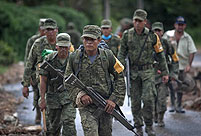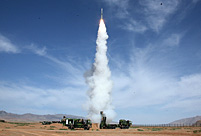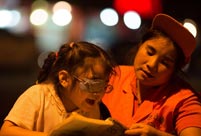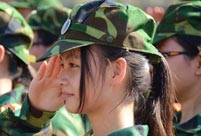WASHINGTON, Sept. 27 -- U.S. President Barack Obama and his Iranian counterpart Hassan Rouhani on Friday sent out olive branches to each other through a phone conversation, which was the first talk between the two countries' heads of state for more than 30 years, regarding the ongoing efforts to pursue a deal over Iran's nuclear program.
MISSED HANDSHAKE, HISTORIC CHAT
Speaking in a televised statement at the White House, Obama confirmed his phone chat with Iranian President Rouhani who has come to New York for the annual high-level debate of the United Nations General Assembly.
"The very fact that this was the first communication between an American and Iranian president since 1979 underscores the deep mistrust between our countries, but it also indicates the prospect of moving beyond that difficult history," said Obama.
However, the two presidents did not have a historic meeting on the sidelines of the 68th UN General Assembly session, or even a hand-shaking occasion in New York, which fell out of previous speculations. And the White House indicated that such an encounter proved to be "too complicated" for the Iranian president due to concerns back home.
Instead, the two presidents directed their diplomatic teams to engage with each other over the stalled negotiations on Iran's nuclear program.
Iranian Foreign Minister Mohammad Javad Zarif met Thursday with his counterparts from Britain, China, France, Germany, Russia and the United States over the country's nuclear program. Later, Zarif and U.S. Secretary of State John Kerry held a side meeting, the first direct contact between the two countries' top diplomats in years. The diplomats were all encouraged by the positive attitudes of Teheran.
Kerry told reporters after the talks that the meeting was " constructive" and that he was impressed by Zarif's presentation that was "very different in tone, and very different in the vision " about the future possibilities.
Speaking at the White House, Obama said after the conversation with Rouhani, he believed "we can reach a comprehensive solution" over Iran's controversial nuclear program.
"Iran's supreme leader has issued a fatwa against the development of nuclear weapons. President Rouhani has indicated that Iran will never develop nuclear weapons," said Obama.
Obama said that the test will be "meaningful, transparent and verifiable actions" that can also bring relief from the comprehensive international sanctions currently in place against Iran.
During their historic conversation, the two presidents also directed their teams to continue to "work expeditiously" and in cooperation with the P5-plus-one to pursue an agreement over Iran' s nuclear program.
The office of the Iranian president also confirmed the phone call via a twitter account. One tweet read that the two presidents expressed their "mutual political will to rapidly solve the nuclear issue."
DRAMATIC THAW, DIFFICULT PATH
Obama said resolving the Iran's nuclear issue could obviously serve as "a major step forward" in a new relationship between the two countries, and help facilitate a better relationship between Iran and the international community.
The two countries ended their diplomatic relationship in 1980, following the 1979 Iran hostage crisis in which a group of Iranian students seized the U.S. embassy in Teheran, the Iranian capital, and held dozens of diplomats captive for more than a year.
Iran has also been under heavy sanction pressures by the United States and the international community over its insistence on pursuing controversial nuclear program, in which Iran has been allegedly working secretly to develop nuclear weapons though Teheran has denied that allegation.
During his presidential campaign, Rouhani vowed to solve Iran's nuclear issue to ease sanctions on Iran's economy.
Before and amid his trip to the UN meetings, the newly elected Iranian president and his government struck a conciliatory note in surprise, signaling its willingness of engagement with the United States and the West. He exchanged letters with Obama, wrote an op- ed in The Washington Post, a major U.S. newspaper, and had an array of interviews. In a television interview, he even told CNN that he believed the ice was already "beginning to break" between his country and the West.
While addressing the UN General Assembly for the first time as president, Rouhani said that his government sought "constructive engagement" with other countries, pledging never to develop nuclear weapons while stressing that the nuclear issue of Iran should be solved through diplomatic path.
The Obama administration has responded to Iran's move with welcoming tone and cautious optimism, acknowledging it an important opportunity in decades that will face plenty of challenges as well. Both sides now need the other to translate the words into actions and their vital concerns remain too far away from being addressed.
"A path to a meaningful agreement will be difficult. And at this point, both sides have significant concerns that will have to be overcome. But I believe we've got a responsibility to pursue diplomacy, and that we have a unique opportunity to make progress with the new leadership in Teheran," said Obama, who also acknowledged that throughout the process, the U.S. will stay in close touch with its allies in the region, including Israel.
 Storms leave 97 dead, 58 missing in Mexico
Storms leave 97 dead, 58 missing in Mexico New model of indigenous surface-to-air missiles testfired
New model of indigenous surface-to-air missiles testfired  118.28-carat diamond to be auctioned in HK
118.28-carat diamond to be auctioned in HK Maternal love under streetlight
Maternal love under streetlight Naked foreign student sits in the middle of a road in Haikou
Naked foreign student sits in the middle of a road in Haikou  Colorful Yunnan: Enjoy the natural beauty
Colorful Yunnan: Enjoy the natural beauty Harbin named Chinese city with most beautiful women
Harbin named Chinese city with most beautiful women New college students' military training in Guangzhou
New college students' military training in Guangzhou Rugby girls
Rugby girls PLA's 38th Group Army conduct training
PLA's 38th Group Army conduct training Residences of the royal house of Savoy
Residences of the royal house of Savoy The last days of Wan Aihua
The last days of Wan Aihua Highlights at 12th National Games of China
Highlights at 12th National Games of China Beijing Film Academy welcomes freshmen
Beijing Film Academy welcomes freshmen Large mahjong party sets new world record
Large mahjong party sets new world recordDay|Week|Month